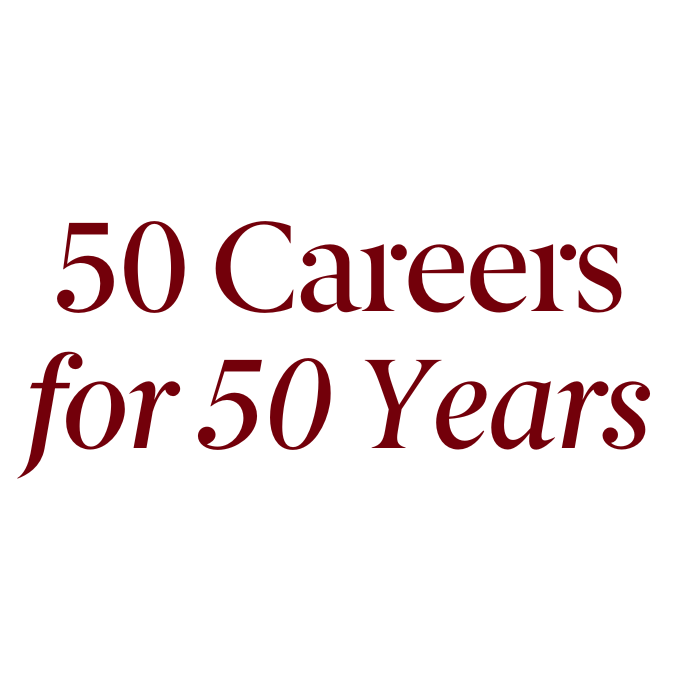
50 Careers for 50 Years
Fifty public health alumni reflect on their educational journeys and the impacts they’ve made across communities, countries, and the world.
February 6, 2025 | Erin Bluvas, bluvase@sc.edu
“You can always change your mind and reinvent yourself,” says Mary Ann Galloway, who is known by her initials: Mag.
From culinary and real estate endeavors to health care consulting across the country, Galloway has done it all. Reinvention is certainly a theme of her career. So is innovation and entrepreneurship. In addition to grit, an open mind and an innate ability to connect the dots, she credits her Master of Public Health (MPH) degree for making the exciting twists and turns of her path possible.
“My MPH degree opened countless doors,” Galloway says. “Beyond providing a robust foundation in public health principles, it taught me to see the intricate connections between economic, environmental, and social determinants of health. This global perspective showed me how health touches everything - from community wellbeing to environmental sustainability to social equity. The systematic thinking I learned has influenced every professional path I've taken."
The daughter of a psychiatrist, Galloway was introduced to government-supported health care at an early age. Her summers were spent on the state grounds working at the recreation facility playing pool and cards with the patients of the William S. Hall Psychiatric Institute.
This early orientation to mental health and health care led Galloway to study psychology at Hollins College in Virgina, though she eventually transferred back home to USC. By this time, she was supporting herself and worked her way through school assisting nuclear physics professor Frank Avignone, and even getting published in the field by drawing graphs for his research.
After graduating in 1972, Galloway worked at an outpatient social and rehabilitation facility in downtown Atlanta – providing support for the individuals who had been released from mental health institutions following hospital closures. As she worked to provide services and programming in this new era, Galloway realized she would need an advanced degree to make the type of impact she desired.
Only around a dozen schools were offering Master of Public Health degrees at the time, but it was respected as the best type of program in the field. Galloway began her master’s degree at Johns Hopkins University but then a new opportunity presented itself.
Major General Easton Marchant, a family friend and chair of USC’s Board of Trustees, let Galloway know that the university was establishing a new school of public health and offered her a scholarship. She arrived on the same day as the inaugural dean, Rolf Lynton, just months after the legislature granted the school’s creation in the spring of 1974.
Without an established curriculum in place, Galloway’s schedule was pieced together with courses from the school of business, allied disciplines from other health sciences units, and visiting faculty from Tulane University. As the Master of Public Health program was designed in parallel with Galloway’s first (and last, due to her credits from Johns Hopkins) year in the program, they learned what worked and what didn’t from her experiences.
Four areas of study were envisioned as the school came into formation: environmental, community health, epidemiology, and planning/administration. With an aptitude for leadership, Galloway focused on health planning and administration while also launching her first business, Maggie’s Farm, selling plants on Millwood Avenue and through “Pot Parties” before selling the business to new owners who moved it to Devine Street.
“The Master of Public Health program opened up a new world to me, and it was nice being exposed to different things,” she says. “The people who were doing the work I was interested in had MPHs, and I was excited to be able to have one that afforded me new opportunities.”
After completing her degree in 1975, Galloway moved to California where she would spend the next decade. She hand-dipped chocolates at a confectionary and drove a cab before landing a job with a health systems agency in San Diego – climbing the ranks to associate director.

When she was ready to return to the East Coast, Galloway took a position with the Psychiatric Institutes of America as Vice President of Development in Washington D.C. Next, she launched a consulting firm, building a thriving business in the Northeast and then across the country.
Galloway spent seven years living on boats – first in the Washington Channel and then in the Baltimore Harbor – with her floating home as her base of operations. Eventually merging her consulting business to work with two other women in the industry, the new firm was called New Ways of Business (NWB) Managed Care Development providing services to community health centers, health care facilities, big accounting firms and other clients in the areas of health care delivery system development, information systems, operations planning, certificate of need support and more.
By the time business slowed in the early 2000s, Galloway was living back in the Carolinas – first on Sullivan’s Island and then (after tiring of hurricane season) in the mountain town of Saluda, North Carolina. A position as the director of planning for a managed care organization brought Galloway to the Midwest, where she also launched a pimento cheese business – delighting residents of Indianapolis with their introduction to the Southern staple.
Her next public health position was with the Indiana Department of Health, where she served as director of the Life Health Course Systems Unit within the Division of Maternal and Child Health. In this role, Galloway looked at social, economic and environmental determinants of health and developed ways to address them. Hers was the only group in the country to produce a report about the environmental impact on children’s health. Galloway was invited to speak on several occasions about this work at the Association of Maternal and Child Health Programs’ annual conference.
When Galloway and her boss’s innovative leadership resulted in a rapid expansion of their program (think: $60 million in grants and quadruple the employees in four years) was seen as a burden rather than a boon, she reinvented herself again. This time, she pursued real estate – getting a broker’s license and representing buyers in Indiana.
With South Carolina’s warmer weather beckoning, Galloway returned to her home state a few years ago. Since retiring from public health, she dabbles in many of her interests. With her first book focused on food and romance, Galloway is finalizing another book about real estate. She also does real estate consulting, and she’s creating an online business where she hopes she can inspire women to be authentically themselves, with confidence and humor. Though still busy, it’s a welcome pace compared to the 30 years of consulting where she traveled up to 250 or even 300 days per year.
“In looking at Mag’s career, I see someone who has refined her own gifts and talents to identify entrepreneurial opportunities and become a pioneer in many different areas,” says Lee Pearson, executive director of operations and accreditation for the Arnold School. “She used her education to add to her already impressive toolkit of skills and talents to create her own opportunities – often in male-dominated spaces that were closed to women at the time – making her way in her own unique way.”

Fifty public health alumni reflect on their educational journeys and the impacts they’ve made across communities, countries, and the world.

Join us as we celebrate the school’s 50th anniversary with guest speakers, symposia, feature stories, and anniversary events for students, alumni, faculty, staff and friends.